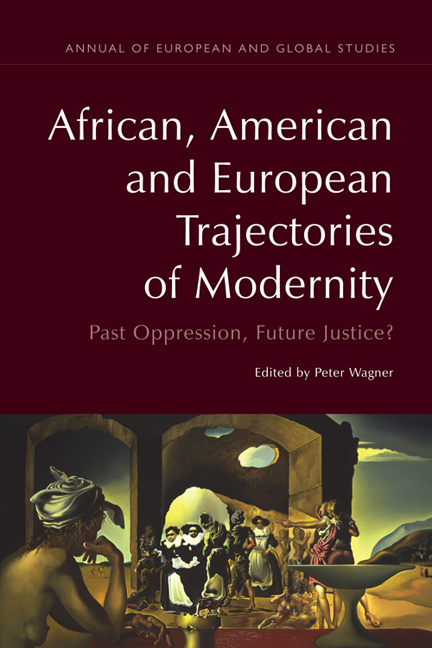Book contents
- Frontmatter
- Contents
- List of Figures
- Introduction
- Part I Reconstructing the History of Atlantic Modernity
- 1 The American Divergence, the Modern Western World and the Paradigmatisation of History
- 2 The Limits of Recognition: History, Otherness and Autonomy
- 3 On Being in Time: Modern African Elites and the Historical Challenge to Claims for Alternative and Multiple Modernities
- 4 The Sublime Dignity of the Dictator: Republicanism and the Return of Dictatorship in Political Modernity
- 5 The Luso-Brazilian Enlightenment: Between Reform and Revolution
- Part II Comparing Trajectories of Modernity in the South
- Part III Claims for Justice in the History of Modernity and in its Present
- Notes on the Contributors
- Index
4 - The Sublime Dignity of the Dictator: Republicanism and the Return of Dictatorship in Political Modernity
from Part I - Reconstructing the History of Atlantic Modernity
Published online by Cambridge University Press: 05 August 2016
- Frontmatter
- Contents
- List of Figures
- Introduction
- Part I Reconstructing the History of Atlantic Modernity
- 1 The American Divergence, the Modern Western World and the Paradigmatisation of History
- 2 The Limits of Recognition: History, Otherness and Autonomy
- 3 On Being in Time: Modern African Elites and the Historical Challenge to Claims for Alternative and Multiple Modernities
- 4 The Sublime Dignity of the Dictator: Republicanism and the Return of Dictatorship in Political Modernity
- 5 The Luso-Brazilian Enlightenment: Between Reform and Revolution
- Part II Comparing Trajectories of Modernity in the South
- Part III Claims for Justice in the History of Modernity and in its Present
- Notes on the Contributors
- Index
Summary
FROM THE SIXTEENTH century on, since Niccolò Machiavelli's momentous rediscovery, the Roman concept of dictatorship has come to occupy a central place in the modern political vocabulary, contributing substantially to the making of political modernity. Fiercely debated in the constitutional discussions ushered in by the revolutionary movements that spread from the mid-seventeenth century up to the nineteenth, it was reinvented in various political forms throughout the twentieth century and regularly enacted during the most critical periods of modern politics. The enduring presence of dictatorship is testified by its multiple historical trajectories, its nearly global geographical dispersion, its ideological pluralisation and broad political diffusion. The concept itself metastasised, reaching to the extremes of the new political divide between Left and Right, all the while becoming a formative influence on the constitutional state of emergency, as it was formulated in the newly founded liberal republics that came to replace monarchical rule.
Hence, as political modernity resurrected the republican model and sought to renovate it to fit modern conditions, dictatorship was transmitted and transformed into a constitutive attribute of the modern experience of politics. The republican legacy of dictatorship was inexorably linked with the consolidation of the centralised state, its strategies of domination, and its spaces of exception. Moreover, it was complicit with the political forces associated with arbitrary autocratic power that led to the disastrous events of the last century (Duverger, 1961: 111–38). Roman dictatorship is a defining feature of the statist spirit of modern politics that daunts the public and individual liberty of citizens, often regarded as constitutive norms of the modern political imaginary.
The chapter advances three claims. First, it establishes the historical and conceptual co-evolution of republicanism and dictatorship in modern political thought. There is a clear correlation between dictatorship and modern republicanism. This genealogical exercise in conceptual history demonstrates that republicanism and dictatorship are coeval. To put it more forcefully, dictatorship is constitutive of republicanism and provides its condition of possibility, in the sense that the latter rests on the former.
Second, the question of dictatorship allows for a critical re- evaluation of modern republicanism as a whole.
- Type
- Chapter
- Information
- African, American and European Trajectories of ModernityPast Oppression, Future Justice?, pp. 77 - 100Publisher: Edinburgh University PressPrint publication year: 2015



